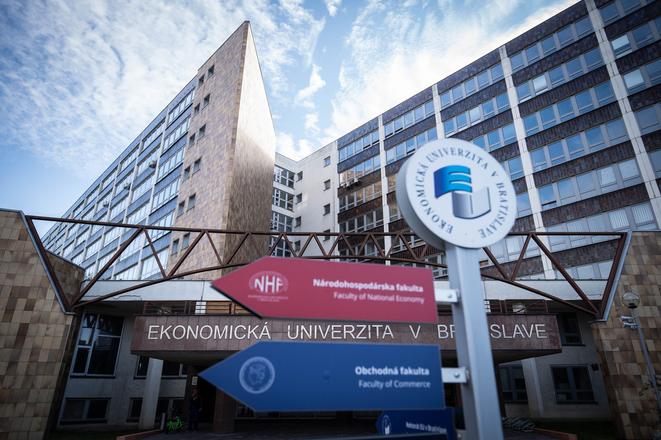New legislation due to come into effect within weeks has been hailed as an important step in raising the quality of Slovak universities.
An amendment to the Higher Education Act that comes into force on February 1 aims to streamline processes in universities and improve the management of the institutions themselves.
Education Minister Tomáš Drucker described the amendment as “an important step towards modernising and streamlining Slovak higher education, and providing universities with better tools to increase quality and competitiveness”.
The amendment deals with areas including the competence of the Academic Senate, the announcement of the election of a university rector, how appointments of senior staff at public universities are made, the formation of boards of trustees, and the qualification requirements for associate professor and professor positions.
Key changes introduced under the amendment include:
Streamlining decision-making processes within individual university bodies, including the elimination of unnecessary duplication in the approval of certain documents.
Making universities more open to renowned Slovak and foreign scientists. This will promote scientific and research development.
Streamlining the management of the assets of public universities, thereby ensuring better management of public finances.
Expanding the composition of the boards of trustees of public universities to include experts from management backgrounds, including representatives of the University Hospital Bratislava, the Slovak National Theatre, the Monuments Office, the Slovak Philharmonic and the Lúčnica Art Ensemble.
Source: Education Ministry
The amendment also aims to streamline the management of the properties of public universities. And it is expected to make their operation more efficient by providing clearer guidelines on issues of incompatibility of functions in the bodies of public universities and their representations.
“The amendment sets a clearer approval line, which will contribute to more efficient functioning of Slovak universities,” said Róbert Zsembera, state secretary (i.e. deputy minister) at the Education Ministry. “The changes were also welcomed by many representatives of the academic community,” he added.
Under the amendment, the time limit during which a rector’s election must be announced will be shortened from 270 days to six months before the expiry of the rector’s term of office. The new rules also state that a rector can only submit a long-term plan to the Education Ministry after it has been approved by the Board of Trustees.
The Academic Senate also retains the right to approve the long-term plan of a public higher education institution.
Meanwhile, the legislation also modifies the internal quality assurance system for higher education.
Universities can request an evaluation report to assess whether their internal system and its implementation are in line with EU standards. An evaluation report may also be produced by a legal entity which is a member of the European Association for Quality Assurance in Higher Education or is registered in the European Quality Assurance Register.
Also, the same person may hold the post of rector or dean for a maximum of three consecutive terms to ensure continuity in the management of higher education institutions. A standard term is four years.
And the new legislation opens up new possibilities for universities to finance their capital expenditure and research activities using state funds and commercial loans. University consortia of universities will now be able to receive earmarked grants directly.
The new legislation allows for the provision of an incentive scholarship to recent graduates obtaining outstanding results in national examinations or for producing an excellent final thesis.
Opposition slams legislation
But the amendment has been criticised by some. The opposition Progressive Slovakia (PS) party said it would contribute to an exodus of young people from the country and that it strengthens the powers of university management at the expense of openness.
“The minister’s amendment changes the composition of university governing boards so that the majority of members are appointed by the Academic Senate at the expense of external experts,” Ingrid Kosová (PS) told the TASR newswire. “Public representatives will be virtually powerless in deciding long-term plans as the necessary supermajority remains in the hands of representatives of the academic environment.”
PS also said the amendment significantly strengthens the competence of university deans while limiting the powers of the Academic Senate and the Scientific Council in the selection of candidates for the post of associate professor or professor. This will significantly reduce the transparency and quality of decision-making, according to MP Tina Gažovičová (PS).
“The governing coalition also pushed through an unjustified proposal to extend rectors’ term of office, which will fundamentally weaken the dynamics of decision-making and innovation,” said Gažovičová.
In response, the Education Ministry pointed out that all members of a university’s board of trustees, including those elected by the Academic Senate, are external experts. It said that by adjusting the conditions for the creation of associate professorships and professorships, universities are becoming more open to renowned Slovak and foreign scientists.
“The creation of a selection committee to fill these posts presupposes that it is staffed by qualified experts, at least one of whose members is not an employee of the university concerned,” said the ministry.
The ministry also rejected the claim that the powers of the Academic Senate and the Scientific Council would be restricted.
“On the contrary, higher education institutions may determine in their statutes, in the exercise of academic freedom, other documents to be decided by these bodies and other tasks to be performed by the Academic Senate and/or the Scientific Council,” it said.
The ministry also disagreed with criticism of the extension of the rector’s term of office.
“The reappointment of a rector or dean is within the competence of the competent bodies of the given higher education institution, taking into account his/her previous performance and management,” it said.



